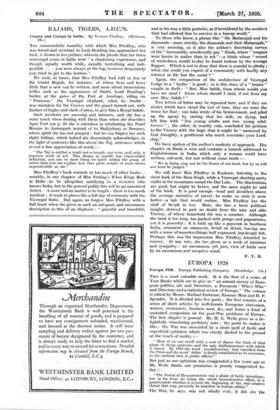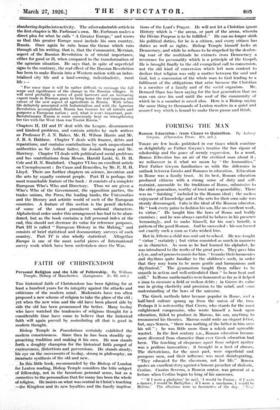EUROPA, 1926
Europa 1926. Europa Publishing Company. (Routledge. 15s.)
THIS is a most valuable work. It is the first of a series of Year Books which are to give us " an annual survey of Euro- pean politics, art and literature, a European ' Who's Who' and Directory and a statistical review of Europe." The volume is edited by Messrs. Michael Farbman, Ramsay Muir and H. F. Spender. it is divided into five parts ; the first consists of a series of short articles by well-known European statesmen, writers, economists, business men, &c., and forms a kind of sustained symposium on the post-War problems of Europe. The first chapter is general. Mr. H. G. Wells gives us a de- lightfully stimulating prefatory note ; the point he makes is this : the War was succeeded by a short spell of facile and superficial optimism which was cruelly dashed to the ground at the touch of reality :— Most of us can recall with- a sort of shame the flush of that phase of cheap optimism and the ugly disillusionment with which it closed. By 1924 the word `reconstruction' had vanished from
t he Press and the word ' debts firmly established as its successor, as the cardinal idea in public affairs."
But just as our optimism was exaggerated a few years ago so Mr. Wells thinks our pessimism is grossly eiaggerated to- day "The Period of Reconstruction was a phase of futile intentions; but so far from its being the whole reconstructive effort, it is questionable whether it is even the beginning of the real creative thrust that may presently be manifest in human affairs."
The War, he says, was not wholly evil ; it did stir the
slumbering depths into activity. The other admirable article in the first chapter is Mr. Farbinan's own. Mr. Farbman makes a direct plea for what he calls " A Greater Europe," and warns us that this greater Europe must include his own country, Russia. Once again he rubs home the theme which runs through all his writing, that is, that the Communist, Mr,rxian, aspect of the Russian Revolution is of trivial importance, either for good or ill, when compared to the transformation of . the agrarian situation. He says that, in spite of superficial signs to the contrary, the real effect of the Russian Revolution has been to make Russia into a Western nation with an indus- trialized city life and a land-owning, individualistic, rural . life:— "For some time it will be rather difficult to envisage the full scope and significance of the change in the Russian villages. It will need probably a series of good harvests and an increasing export trade in Russian grain to bring home the real meaning and extent of the new aspect of agriculture in Russia. With urban life definitely associated with Industrialism and with the Agrarian Revolution accomplished, Russia has become for all intents and purposes a European nation ; and, what is morn important, post- Revolutionary Russia is more consciously bent on strengthening her ties with the West than was Tsarist Russia."- Chapters II, III and IV deal with the League, disarmament and kindred problems, 'arid contain articles by such writers as ProfesSor P. J. N. Baker, Mr. Ii. Wilson Harris and Mr. _ J. B. S. Haldane. Chapter V deals with finance, _debts and reparations, and 'Contains' contributioni by such unquestioned authorities as Sir Arthur Salter, Sir Josiah Stamp and Mr. Heitrey.' Chapter VI deali with'pOlitical and social problems and has contributions frdni Messrs. Harold Laski, G. D. H. Cole and H. N. Biailsford.' Chapter VI has an excellent article on Unemployment : Its Cause and Remedies, by Mr. E. M. H. Lloyd. There-are further chapters on science, invention and the arts • by- equally eminent people. - Part II is perhaps the most remarkable feature of the book : it consists of a complete European Who's Who and Directory: • Thus we are given a Who's Who of the Government,' the opposition parties, the trades unions, the Press, the leading banks, the -Universities and the literary and artistic world of each of the European
• countries: A feature of this section is the pencil 'sketches
• of some of the most proMinent national Character.s. Alphabetical order under this arrangement has had-to be aban- doned, -but as the book' contains 'a full personal index it the end, this -should not decrease its value for reference purposes. Part -III is called " European History in the Making," and consists of brief statistical and documentary surveys Of. each country. Part -IV also wholly statistical: Altogether 'Europa is one of the most useful pieces of International survey work which hive been undertaken since the War,























































 Previous page
Previous page